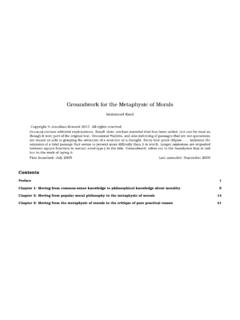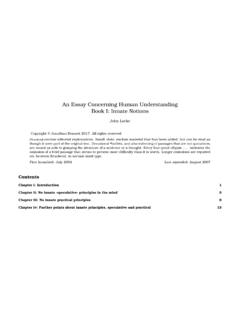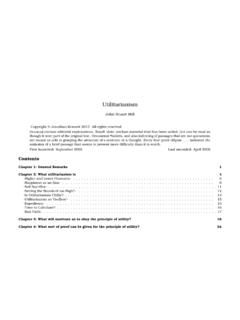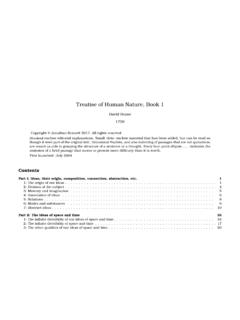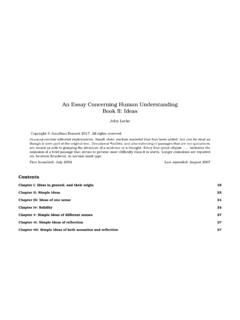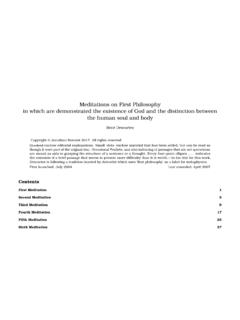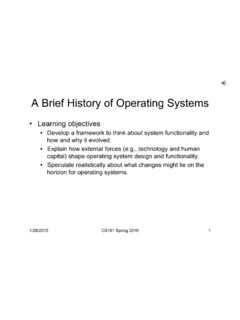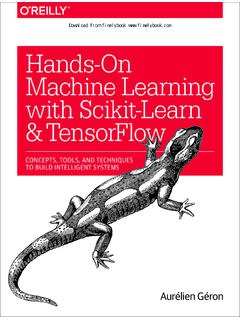Transcription of The Prince - Early Modern Texts
1 The PrinceNiccol MachiavelliCopyright Jonathan Bennett 2017. All rights reserved[Brackets]enclose editorial explanations. Small dots enclose material that has been added, but can be read asthough it were part of the original text. Occasional bullets, and also indenting of passages that are not quotations,are meant as aids to grasping the structure of a sentence or a thought. Every four-point ellipsis .. indicates theomission of a brief passage that seems to present more difficulty than it is worth. Longer omissions are reportedbetween brackets in normal-sized type. The division into twenty-six chapters is Machiavelli s; the division intotwo Parts is not. Previous translations that have been continuously consulted are: translated and edited by Robert Martin Adams (Norton Critical Edition, 1977). Don t confuse this Adams ( ) with the now better-known Robert Merrihew Adams (b.)
2 1937). [borrowed from on pages 35 and 45] translated by Russell Price and edited by Quentin Skinner (Cambridge U. P., 1988) [borrowed from onpage 40] edited and translated by Peter Constantine ( Modern Library, 2007), translated by Tim Parks (Penguin Classics, 2009). [borrowed from on page 53]Of these, the most swingingly readable version is Parks s, though it embellishes the original more than any otherversion, including the present one. Each of the other three has helpful explanatory notes. Parks has a glossary ofproper names . The present version received many small helps from these predecessors in addition to the fouracknowledged launched: August 2010 The PrinceNiccol MachiavelliContentsDedication: To his Magnificence Lorenzo Di Piero De Medici1 Part I: Kinds of principality; how to get and retain them2 Chapter 1: Different kinds of principalities, and how to acquire them2 Chapter 2: Hereditary principalities2 Chapter 3: Mixed principalities3 Chapter 4: Why Darius s kingdom, conquered by Alexander, didn t rebel against his successors after his death8 Chapter 5: How to govern cities or principalities that lived under their own laws before they were annexed10 Chapter 6: New principalities that are acquired by one s own arms andvirt 11 Chapter 7: New principalities acquired by the arms and thefortunaof others13 Chapter 8: Principality obtained through wickedness17 Chapter 9: Civil principality20 Chapter 10: How to measure the strength of a principality22 Chapter 11: Ecclesiastical principalities24 Part II: Other aspects of political power26 Chapter 12: Different kinds of armies.
3 Mercenaries26 Chapter 13: Auxiliaries, mixed armies, citizen armies29 Chapter 14: A Prince s military duties31 The PrinceNiccol MachiavelliChapter 15: Things for which men, especially princes, are praised or blamed33 Chapter 16: The free spender and the tightwad34 Chapter 17: Cruelty and mercy. Is it better to be loved than feared?35 Chapter 18: How princes should keep their word37 Chapter 19: How to avoid attracting contempt and hatred39 Chapter 20: Are fortresses, and other princely devices, advantageous or hurtful?44 Chapter 21: What a Prince should do to acquire prestige46 Chapter 22: The ministers of princes48 Chapter 23: How to avoid flatterers49 Chapter 24: Why the princes of Italy have lost their states51 Chapter 25: The role offortunain human affairs and how to withstand it52 Chapter 26: A plea to liberate Italy from the barbarians54 The PrinceNiccol MachiavelliGlossaryAfrica:At the time Machiavelli is writing about on page 18, Africa named a coastal strip of north Africa, including someof what are now Tunisia, Algeria, and Libya.
4 The site of cityCarthage is now the site of a suburb of :On page 5 Machiavelli speaks of the more weak and the more strong , with no noun. He could be talkingabout(i)weaker and strongerindividualsorfactionswithinthe acquired state, or(ii)weaker and strongersubstatesorprovincesof which the newly acquired state is made up. Therest of that chapter hooks into(ii); but page 5 also makesMachiavellian sense when taken in the manner of(i); perhapshe meant to be talking about both at :This word occurs nearly 60 times in the occurrences of it could be translated by luck , butfor Machiavelli its meaning is clearly broader than that something more like circumstances beyond one s control .The interplay between this andvirt is a dominant themeinThe Prince .[For a superb discussion of this theme, see J. G. sThe Machiavellian Moment(Princeton University Press, 2003),chapter 6.]
5 ]Sofortunais left untranslated except whereMachiavelli writes of someone sprivata fortuna, meaninghis status or condition as an ordinary citizen (rather thansomeone with rank and power). The five occurrences of thisare all translated by ordinary citizen . Italian lets us choosebetween it and she forfortuna, but nothing in this workinvites us to personalize it except the striking last paragraphon page :When Machiavelli speaks of people as living free (liberi)or in freedom (in libert ) he usually means that they areself-governing rather than being subjects of a Prince . (Anexception isliberissimeon page 23.) On page 10 there isa good example of why it won t do to translatelibert by self-government throughout or to translate it sometimes by self-government and sometimes by freedom .gentlemen:This seems to be the best we can do withMachiavelli sgentili uomini, but his meaning seems to besomething more like men who have some kind of rank ortitle.
6 Thus, making themhisgentlemen [page 14]means giving each of them some kind of rank or title or standing athis own court or within his own government . Prince :In this workprincipeisn t a title and doesn t desig-nate a rank; it stands for any ruler of a state, whether a kingor queen or duke or count etc. The English word Prince alsohad that broad meaning once (Queen Elizabeth I referred toherself as a Prince ), and it seems the best word to use :It means having to do with this world as distinctfrom the heavenly world of the after-life . The underlyingthought is that this world is in time ( temporal ) whereas theafter-life is eternal in some way that puts it outside :This word occurs 60 times in this work, and itscognate adjectivevirtuosooccurs another dozen times. Adominant theme throughout is the difference betweenvirt andfortunaas factors in a man s life.
7 Usuallyvirt meanssomething like ability , but it can mean strength or even virtue . It is left untranslated so that you can make yourown decisions about what Machiavelli means by it on a :Machiavelli sometimes switches suddenly from talkingabout what a Prince must do to talking about whatyoumust do, as though he were addressing the Prince . Any suchswitch (the first is on page 3) is Machiavelli s own and notan artifact of this PrinceNiccol MachiavelliDedicationDedicationTo his Magnificence Lorenzo Di Piero De MediciThose who try to win the favour of a Prince usually come tohim with things thattheyregard as most precious, or thatthey seehimtake most pleasure in; so we often we oftensee princes being presented with horses, arms, cloth of gold,precious stones, and similar ornaments that are worthy oftheir to present myself to your Magnificence with sometestimony of my devotion towards you, the possession ofmine that I love best and value most is my knowledge ofthe actions of great men knowledge that I have acquiredfrom long experience in contemporary affairs and from acontinual study of antiquity.
8 Having reflected on it long andhard, I now send it, digested into a little volume, to being sure that this work is worthy of being pre-sented to you, I am trusting that you will be kind enough tofind it acceptable, seeing that I can t give you anything betterthan the opportunity to get a grasp, quickly, of everythingthat it has taken me so many difficult and dangerous yearsto learn. Many writers decorate their work choketheirwork with smoothly sweeping sentences, pompous words,and other attractions that are irrelevant to the matter inhand; but I haven t done any of that, because I have wantedthis work of mine to be given only such respect as it can getfrom the importance of its topic and the truth of what it saysabout people think it would be presumptuous for a manwhose status is low to discuss the concerns of princes and give them rules for how to behave; but I don t agree.
9 Alandscape painter will place himself on the plain in orderto get a good view of the mountains, and on a mountain inorder to get a good view of the plain. So also, to understandthe nature of the people one needs to be a Prince , and tounderstand the nature of princes one needs to be of then this little gift in the spirit in which I sendit. If you read and think about it, you ll see how greatly Iwant you to achieve that greatness which fortune and yourother attributes promise. And if your Magnificence, from themountain-top of your greatness will sometimes look downat this plain, you will see how little I deserve the wretchedill-fortune that continually pursues me.[ worked for 18 years for the Florentine Republic; when theRepublic collapsed in 1512 under attack by the Medici and their allies, he lost his elevated government position, was accused of conspiracy, questioned under torture, then re-leased, and retired to his farm, where he wroteThe Princeand other six or seven years of this, Machiavelli did administrative work for some Florentine merchants, was consulted by the Medici government on a policy question, returned to Florence where he was celebrated as a writer, was engaged by Cardinal de Medici to write a history of Florence, hoped to re-enter high levels of government when in 1527the Medici were again ejected and the Florentine republic re-established.]
10 But died in June continuing wretched ill-fortune of which he writes consisted inpoverty and the lack of worthy employment during his years on the Princewas not published until after his recipient of the Dedication was not the famous Lorenzo theMagnificent (patron of Leonardo, Michelangelo etc.), but a grandson ofhis.]1 The PrinceNiccol Machiavelli2: Hereditary principalitiesPart IKinds of principalityHow to get and retain themChapter 1 Different kinds of principalities, and how to acquire themAll states, all powers that rule over men, are eitherrepublicsorprincipalities. (I am saying all this about the past as wellas the present.)Principalities are eitherhereditary, governed by onefamily over very many years, or they new principality may be entirely new, as Milan was toFrancesco Sforza, or it may be (so to speak) a limb graftedonto the hereditary state of the Prince who has acquired it,as when the kingdom of Naples was acquired by graftedonto the kingdom of dominion acquired in this way(1)may have beenaccustomed before the acquisition to live under a Prince ,or may have lived in freedom[see Glossary]; and the acquisition(2)may have happened through the arms of the acquiring Prince himself, or through the arms of others; and theacquisition(3)may have been a matter offortuna[see Glossary]or a product ofvirt.

